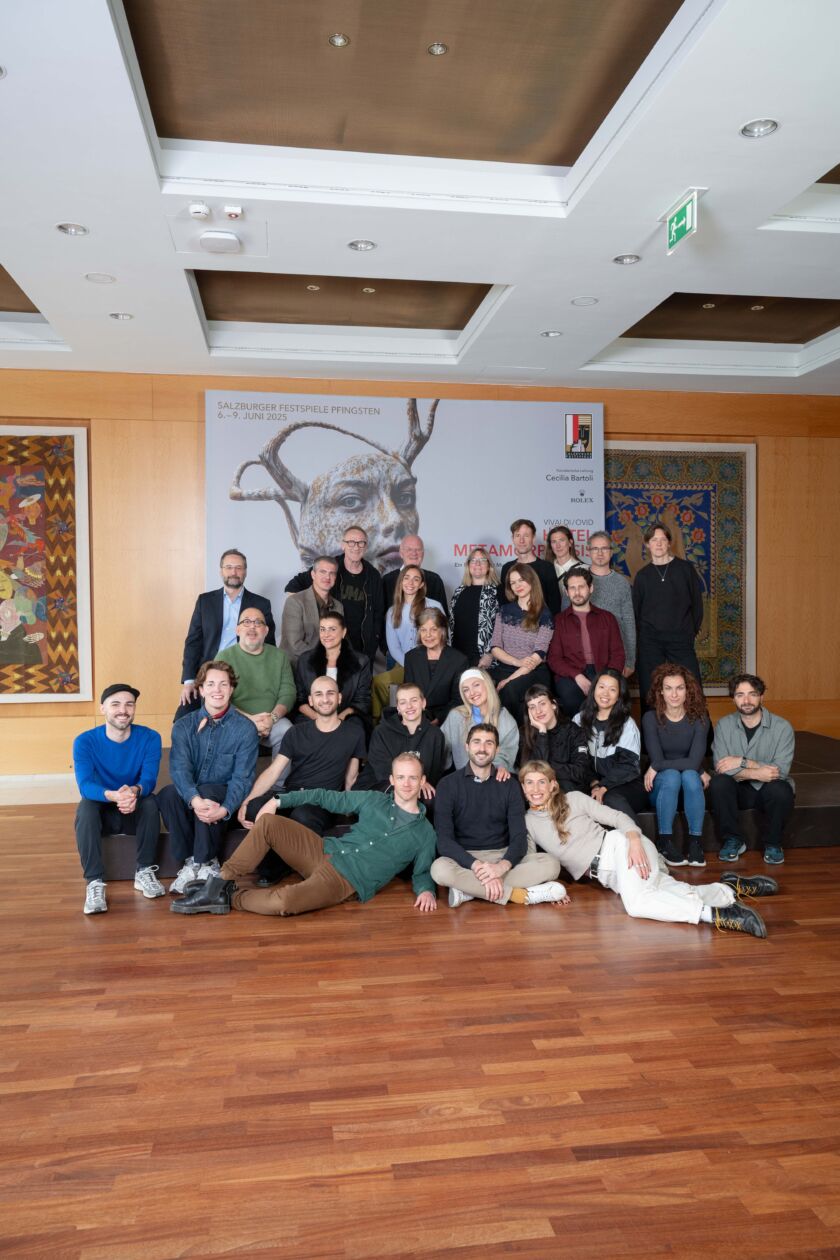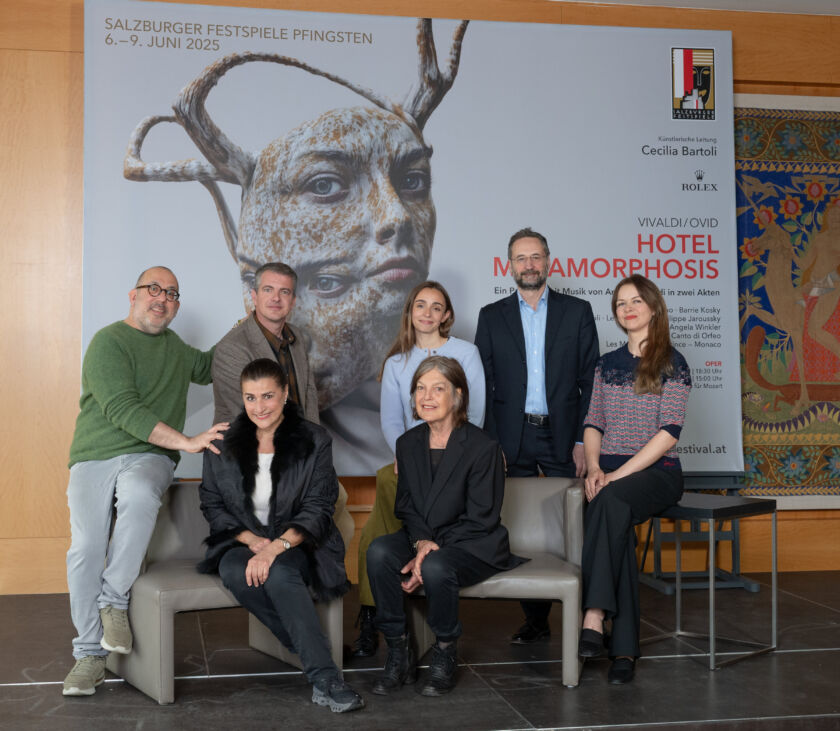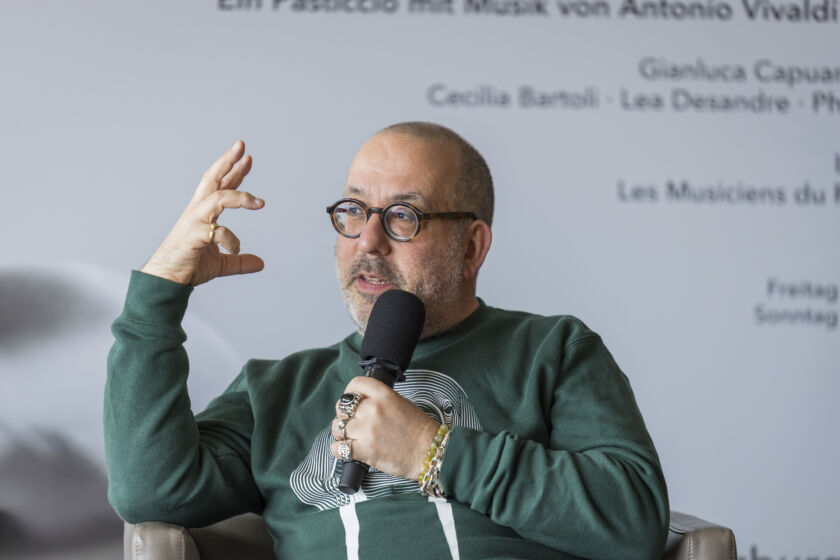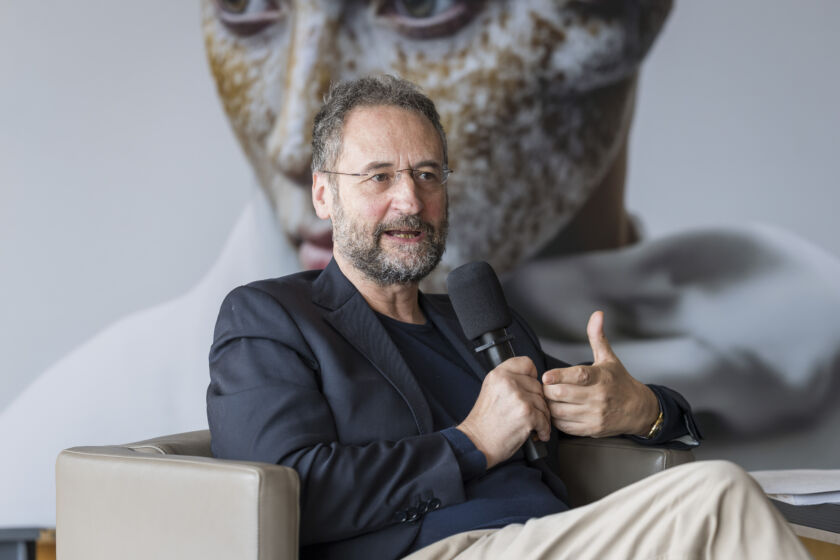“We need mythological stories in our present time.”
Press Talk on the Production Hotel Metamorphosis


Ten days ago, rehearsals commenced for this year’s opera production of the Salzburg Whitsun Festival. The premiere of the opera pasticcio is scheduled for 6 June. The first question to director Barrie Kosky at the outset of the press conversation concerned the genesis of the piece over the course of three years, and it was asked by Olaf A. Schmitt, who collaborated on the concept and dramaturgy of the production. Kosky recounted that it took several years until the long-standing wish for a collaboration between Artistic Director Cecilia Bartoli and him could be implemented. When it finally happened, the idea of creating a totally new work was a joint one: “When I suggested to Cecilia that we do a pasticcio for the 21st century, her eyes immediately lit up. I have always been interested in the form of the pasticcio – the idea that a composer creates a new work from existing musical material. It’s a form that allows you to create something totally new – also by incorporating elements of dance.” In this manner, the idea of combining a story with music by Antonio Vivaldi arose. Ovid as a literary model suggested itself, as Ovid was not only Shakespeare’s favourite author, but also created something akin to a “cookbook for the renaissance”, as generations of painters and musicians were inspired by his more than 250 mythological tales. “We selected five stories from his Metamorphoses, combining them with more than 40 pieces by Vivaldi,” Kosky continues.
“The entire evening is narrated from the perspective of Orpheus, played by the great Angela Winkler. The dreams of Orpheus are the points of departure for the stories.”

It is unclear how many operas Vivaldi actually wrote, both Olaf A. Schmitt and conductor Gianluca Capuano emphasized, the latter adding: “To this day, new works by Vivaldi are being discovered; like Johann Sebastian Bach, after his death he remained in the collective memory mainly as an outstanding instrumentalist, rather than a composer. During his lifetime, he was better known for the instrumental works he had published, while his operas and sacred compositions tended to be almost entirely forgotten”. Only in 1926 did researchers discover a trove of Vivaldi autographs, making his output as an opera composer accessible. “Another decisive turning point, however, was created by Cecilia Bartoli, whose 1999 album sparked what might be called a veritable Vivaldi renaissance. This shed an entirely new light on his oeuvre.”
Asked by Olaf A. Schmitt how the performers were chosen for this current project, Kosky replied: “Vivaldi’s operas are occasionally lacking a great dramaturgical arch – quite unlike George Frideric Handel’s works, for example. The advantage of our form of the pasticcio is that we can string together a selection of musical highlights. These include pieces which have been recorded by Cecilia Bartoli, Lea Desandre and Philippe Jaroussky, for example.” Given this background, the vocal roles were selected and cast, also with a view to the young generation of artists. There are also multiple dance and choral elements, leading to a large-scale work of musical theatre lasting more than three hours. Kosky pointed out that the important elements to him were the emotional states conveyed to the audience through the character of Orpheus. “We are using a wonderful new German translation of Ovid, which is compelling in its great clarity,” Kosky added regarding the concept. “The story of Orpheus and Eurydice is told from the perspective of Eurydice. We also use the Pygmalion episode, whom Venus allows to speak with the figure he has created. Then there are the stories of Arachne, Myrrha and Echo and Narcissus – all tales of transformation. Ovid talks a lot about gender transformations. We need mythological stories in our present time: they recount the secrets of life. It’s as if time had stood still, and Vivaldi’s music transports us into a mythological dream-world.”

Asked about the diversity and the many colours of the music, Capuano said: “We keep discovering new things every day. The audience will ask itself at some points whether they are really hearing Vivaldi.” This also includes the use of specific instruments such as the shawm, Kosky added.
His idea had always been to have the narrating Orpheus played by a woman, Kosky continued. To him, Angela Winkler is the ideal cast, as she has the ability to lend the character the necessary melancholy depth.
The title of the piece is derived from the fundamental distinction between two worlds, he said, a realistic one with people, and a surreal dream world. The recurring musical states of melancholy and loneliness are symbolized by the sterile, anonymous atmosphere of a hotel room, which is then filled with the emotional states of a dream world. Formally, there are passages in which text and music are divided by pauses, and others in which the texts are underlaid with music. The arias taken from Vivaldi’s operas and their texts have been chosen to match the situation depicted in the pasticcio; Kosky described the five stories as self-contained episodes. In this manner, a new score is being developed during the six-week rehearsal process – a score also subject to continuous transformation.
